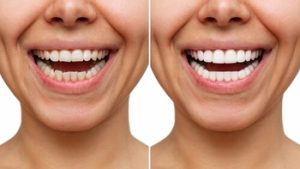Whether porcelain or composite, veneers are popular for achieving a beautiful, radiant smile. Bonded to the front of your natural teeth, these thin shells can dramatically enhance your appearance and confidence. However, proper care is essential to keep your veneers in top condition and secure the longevity of your investment. This comprehensive guide delves into how to care for your veneers, covering everything from daily maintenance to professional advice.
Porcelain vs. Composite Veneers: Understanding the Differences
Before exploring how to care for your veneers, it’s important to understand the two primary types: porcelain and composite veneers. Here’s a closer look at each:
Porcelain Veneers
 Porcelain veneers are highly regarded for their outstanding durability and high resistance to stains. They are designed to provide a long-lasting solution for enhancing your smile. These veneers are custom-made in a dental lab and typically require multiple dental visits to complete the application process. Their natural look and ability to mimic the light-reflecting properties of natural teeth make them a popular choice for those seeking lasting aesthetic improvement.
Porcelain veneers are highly regarded for their outstanding durability and high resistance to stains. They are designed to provide a long-lasting solution for enhancing your smile. These veneers are custom-made in a dental lab and typically require multiple dental visits to complete the application process. Their natural look and ability to mimic the light-reflecting properties of natural teeth make them a popular choice for those seeking lasting aesthetic improvement.
Composite Veneers
Composite veneers, in contrast, are a more economical option and can be applied in a single dental visit. These veneers are made from composite resin material and are directly sculpted onto the teeth by your dentist. While composite veneers offer a quicker and less expensive solution, they are less durable and more prone to staining compared to porcelain veneers. Despite these differences, both types of veneers require diligent care to maintain their appearance and functionality over time.
The Cornerstone of Veneer Care: Proper Oral Hygiene
Maintaining adequate oral hygiene is essential for keeping your veneers in top condition. Like natural teeth, veneers can accumulate plaque and tartar, leading to oral health issues such as gum disease and tooth decay. Here are some essential tips to keep both your natural teeth and veneers clean:
Brush Your Teeth Twice a Day
Brushing your teeth twice daily is a non-negotiable part of any oral hygiene routine. Use a soft-bristled toothbrush-manual or electric- to clean your teeth gently. Hard-bristled toothbrushes can scratch the surface of your veneers, compromising their appearance. Opt for a non-abrasive fluoride toothpaste to protect the bonding cement that holds your veneers in place.
Floss Daily
Flossing eliminates food debris and plaque between teeth and the gum line. Be gentle when flossing around your veneers to avoid damaging the edges. Dental floss or interdental brushes can also effectively clean those hard-to-reach areas.
Use an Alcohol-Free Mouthwash
Rinse with an alcohol-free mouthwash to eliminate bacteria and freshen your breath. Alcohol-based mouthwashes can weaken the bonding agent used for veneers, so it’s best to avoid them.
Smart Dental Habits: Protect and Perfect Your Veneers
In addition to maintaining a regular oral hygiene routine, adopting good dental habits can significantly extend the life of your veneers. Here are some practices to include in your daily routine:
Avoid Hard and Chewy Foods
While veneers are made to be durable, they are not indestructible. Avoid biting hard objects such as ice, nuts, or candies, as this can cause your veneers to chip or crack. Similarly, steer clear of chewy foods like caramel or taffy, which can pull at your veneers and weaken the bonding cement.
Don’t Use Your Teeth as Tools
Using your teeth to open bottles or packages is strongly discouraged. This habit can easily damage your veneers and lead to costly repairs. Always use the appropriate tools for such tasks.
Wear a Mouth Guard
Wearing a mouth guard is essential if you grind your teeth at night or participate in contact sports. Grinding can cause noticeable damage to your natural teeth and veneers, while a sports mouth guard can protect your smile from unexpected impacts.
Regular Dental Visits: Your Key to Long-Lasting Veneers
Regular dental check-ups and professional cleanings are pivotal for preserving your veneers and healthy teeth. Here’s why visiting your dentist regularly should be part of your dental veneer aftercare routine:
Scheduling Regular Dental Check-Ups
Scheduling regular dental check-ups allows your dentist to monitor the condition of your veneers and deal with any potential issues early on. They can also offer valuable guidance on veneer care and suggest adjustments to oral hygiene practices.
Professional Cleanings
Professional cleanings remove tartar build-up that regular brushing and flossing might miss. Dental professionals use certain tools to clean your teeth thoroughly, ensuring your veneers remain spotless and your gums healthy.
Dietary and Lifestyle Choices: Keep Your Veneers Looking Great
Food and drinks can affect the longevity and appearance of your veneers. Here are some dietary and lifestyle tips to keep in mind:
Be Mindful of Staining Foods and Drinks
While porcelain veneers are stain-resistant, they are not completely immune to discolouration. Limit intake of staining foods and drinks such as tea, coffee, red wine, and dark berries. If you submit, rinse your mouth with water afterwards to minimise the risk of stains.
Chew Gum with Caution
Sugar-free gum can stimulate saliva production and clean teeth, but be cautious when chewing. Opt for softer gum to avoid putting too much pressure on your veneers.
Stay Hydrated
Drinking plenty of water benefits overall health and helps maintain good oral hygiene. Water washes away food debris and bacteria, keeping your mouth clean and your veneers looking their best.
Troubleshooting Common Veneer Issues
You may encounter some common issues with your veneers despite your best efforts. Here’s how to address them:
Staining: If your veneers start to stain, visit your dentist for a professional cleaning. They can use specialised equipment to remove surface stains and restore your veneers to their original brightness.
Chipping or Cracking: Accidents happen, and veneers can chip or crack. If this occurs, contact your dentist immediately to evaluate the damage and discuss the most appropriate action, whether repairing the veneer or replacing it entirely.
Sensitivity: Some people may experience increased sensitivity after getting veneers. This is usually temporary and should subside over time. Using sensitive teeth toothpaste can help ease discomfort. If sensitivity remains, consult your dentist for further evaluation.
Veneer Care On the Go: Travel Tips for a Perfect Smile
Travelling doesn’t mean you should neglect your veneer care routine. Here are some tips to maintain your oral hygiene while on the go:
Pack a Travel Oral Hygiene Kit
Include a travel-sized toothbrush, toothpaste, floss, and mouthwash in your kit. These essentials ensure you can keep up with your oral hygiene routine, no matter where you are.
Stay Hydrated
Staying well-hydrated while travelling helps rinse away food particles and bacteria, keeping your mouth clean and your veneers in optimal condition.
Avoid In-Flight Sugary Snacks
Airplane snacks are often high in sugar, which can promote plaque build-up. Choose healthier options like nuts, cheese, or fresh fruit to protect your veneers.
Handling Emergencies with Veneers
 Even with the best care, emergencies can occur. Knowing how to respond can help prevent further damage:
Even with the best care, emergencies can occur. Knowing how to respond can help prevent further damage:
Veneer Falls Off
If your veneer falls off, keep it safe and contact your dentist immediately. They can reattach it or suggest a replacement.
Severe Discomfort
If you experience severe discomfort or pain, it may indicate an underlying issue. Contact your dentist as soon as possible to address the problem.
Veneer Care for Life’s Unique Situations
Life is full of unique situations that require a bit more attention to your veneer care. Here’s how to navigate some common scenarios:
Pregnancy
Hormonal changes during pregnancy can significantly impact your gums and overall oral health. Pregnancy gingivitis, characterised by swollen, bleeding gums, can affect the longevity of your veneers. To ensure your veneers and gums remain healthy during pregnancy:
- Maintain a Diligent Oral Hygiene Routine: Continue brushing twice and flossing daily to prevent plaque build-up.
- Visit Your Dentist Regularly: Schedule more frequent dental check-ups to keep an eye on your oral health and address any issues promptly.
- Eat a Balanced Diet: Consume a diet rich in vitamins and minerals to promote overall dental health.
Orthodontic Treatment
Orthodontic treatment may be necessary even after getting veneers, especially if teeth alignment issues arise. Here’s what to consider:
- Consult Your Dentist: Before starting any orthodontic treatment, discuss it with your dentist to explore options compatible with your veneers.
- Consider Clear Aligners: Clear aligners like Invisalign are often a suitable option for veneer wearers as they apply gentle pressure without brackets that could damage the veneers.
- Follow-Up Care: Ensure you follow the dentist’s care instructions to protect your veneers during treatment.
Age-Related Changes
As you age, your dental needs and the condition of your veneers may change. Here’s how to adapt your care routine:
- Regular Dental Check-Ups: Continue with regular dental visits to monitor the condition of your veneers and natural teeth.
- Address Wear and Tear: Over time, veneers may experience wear and tear. Your dentist can polish or repair them as needed to maintain their appearance.
- Adapt Your Oral Hygiene Routine: As manual dexterity may decrease with age, consider using electric toothbrushes and water flossers to maintain effective oral hygiene.
Changes in Health Conditions
Specific health conditions and medications can affect your oral health, necessitating adjustments in veneer care:
- Diabetes: If you have diabetes, you are at a higher risk for gum disease, which can affect your veneers. Maintain strict oral hygiene and regular dental visits.
- Dry Mouth: Medications or conditions causing dry mouth can increase the risk of decay and affect your veneers. Stay hydrated, use saliva substitutes, and avoid sugary foods and drinks.
Lifestyle Changes
Major lifestyle changes, such as starting a new fitness regimen or changing your diet, can also impact your veneer care:
- Fitness Regimens: If you engage in contact sports or high-impact activities, always wear a mouth guard to protect your veneers from accidental damage.
- Dietary Adjustments: Adjust your diet to avoid foods and drinks that can stain or damage your veneers.
Dental Emergencies
Unexpected dental emergencies can occur, and knowing how to handle them is essential for protecting your veneers:
- Immediate Response: If a veneer chips, cracks, or falls off, save the piece and contact your dentist immediately.
- Temporary Solutions: Use dental wax to cover sharp edges and prevent injury to your mouth until you can see your dentist.
FAQs About Veneer Care
How Often Should I Brush My Veneers?
Brush your veneers at least twice daily using a soft-bristled toothbrush and non-abrasive fluoride toothpaste.
Can I Use Any Mouthwash with Veneers?
Use an alcohol-free mouthwash to avoid weakening the bonding agent used for veneers.
Can I Use an Electric Toothbrush with Veneers?
Yes, an electric toothbrush is safe for veneers and can help maintain proper oral hygiene.
 Is Flossing Necessary with Veneers?
Is Flossing Necessary with Veneers?
Yes, flossing daily is crucial for removing plaque and food debris and preventing gum disease and tooth decay.
Will My Veneers Last Forever?
With proper care, veneers can last many years, but they may eventually need to be replaced due to wear and tear. Frequent dental visits and proper oral hygiene are key to longevity.
Closing Note: Invest in Your Smile
Caring for your veneers involves good oral hygiene, regular dental visits, and mindful lifestyle choices. Following the tips outlined in this guide ensures that your veneers remain beautiful and functional for years. Remember, your smile is an investment, and with proper care, you can enjoy a radiant, healthy smile that enhances your confidence and enhances your overall well-being. So, embrace these practices, visit your dentist regularly, and keep flashing that stunning smile!
If you’re considering veneers or need more information on how to care for them, contact Beyond Infinity Dental at (02) 8806 3799. Our team is here to help you achieve and maintain the perfect smile.
Sources:
- Dentistry Today. (n.d.). Stain-Resistant Veneers: What You Need to Know. Retrieved from https://www.dentistrytoday.com/sp-1635805017/
- WebMD. (n.d.). Invisible Orthodontic Aligners. Retrieved from https://www.webmd.com/oral-health/invisible-orthodontic-aligners
- Crest. (n.d.). 20 Foods and Drinks That Stain Your Teeth. Retrieved from https://crest.com/en-us/oral-care-tips/teeth-stains/20-foods-and-drinks-that-stain-your-teeth/
- MouthHealthy. (n.d.). Women’s Hormones and Dental Health. Retrieved from https://www.mouthhealthy.org/en/all-topics-a-z/womens-hormones-and-dental-health










